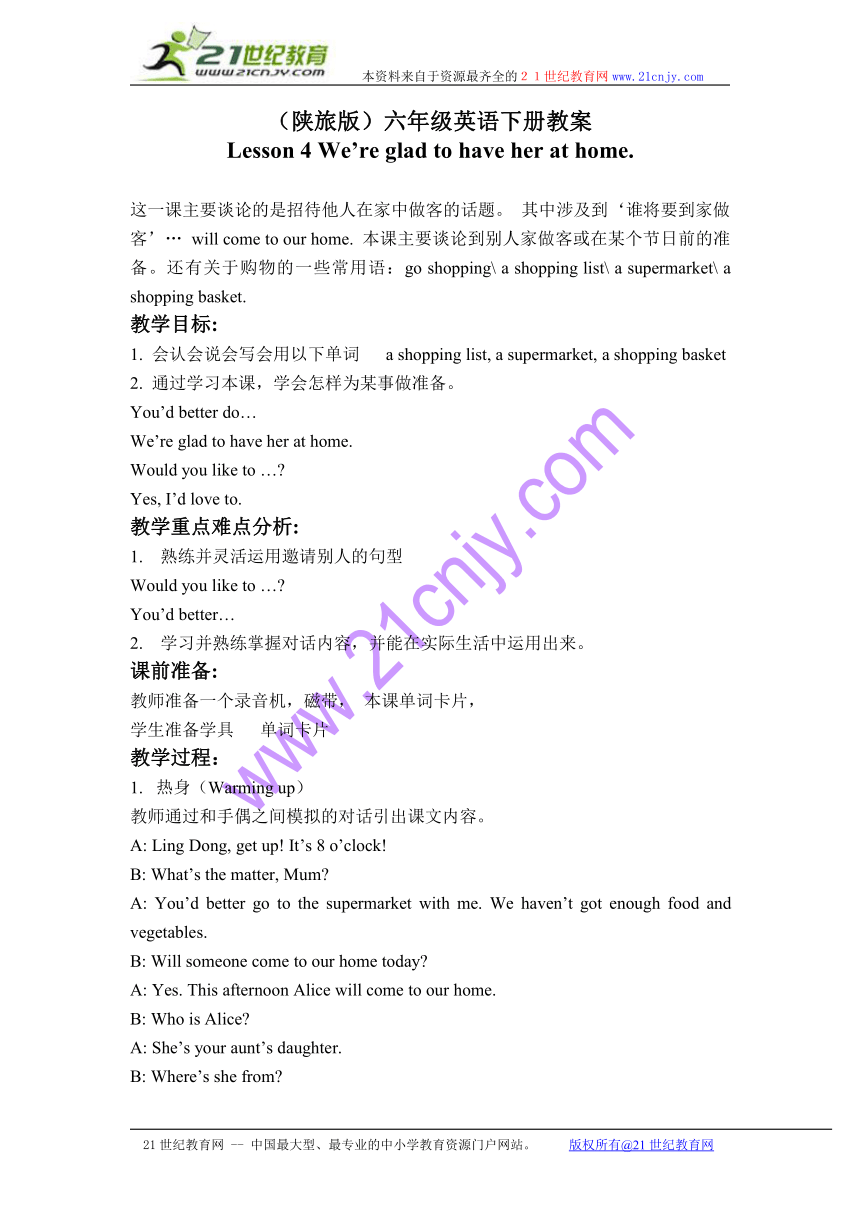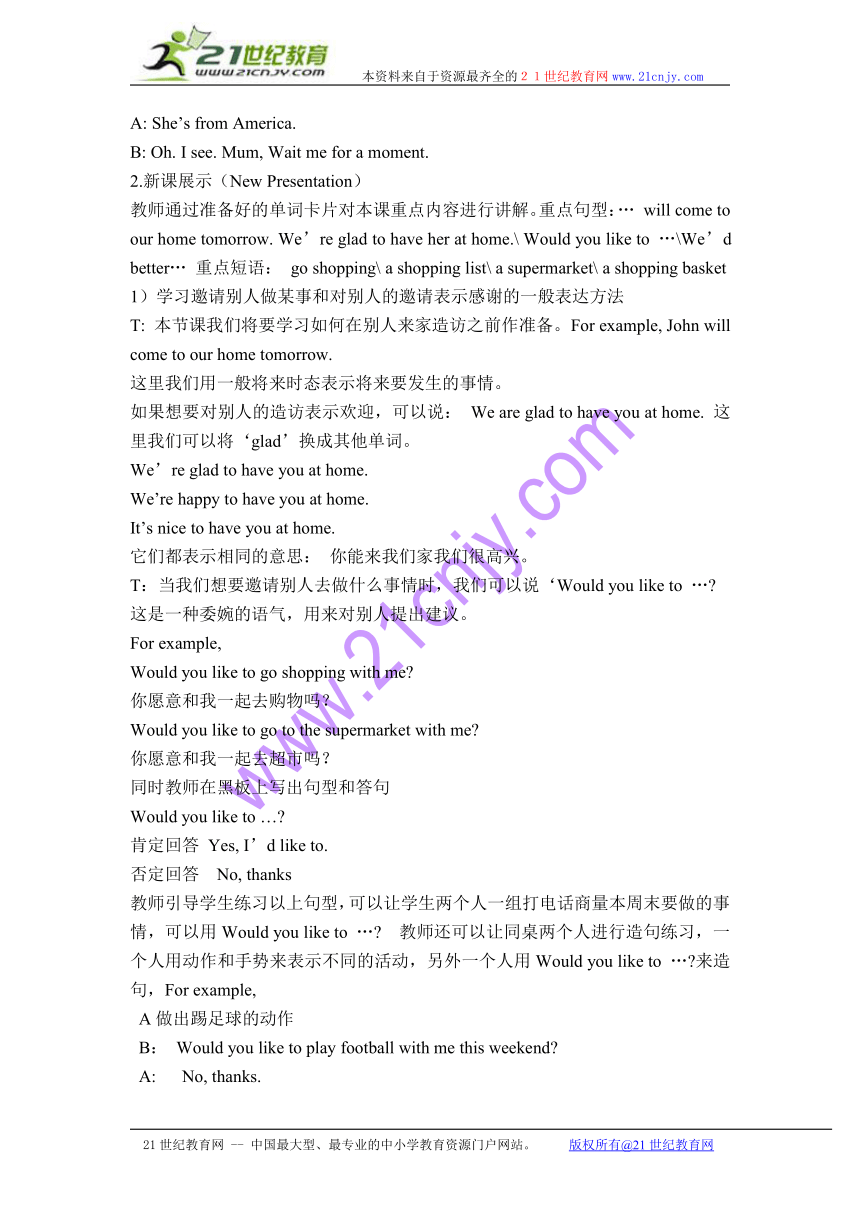六年级英语下册教案 lesson 4(1)(陕旅版)
文档属性
| 名称 | 六年级英语下册教案 lesson 4(1)(陕旅版) |  | |
| 格式 | rar | ||
| 文件大小 | 13.5KB | ||
| 资源类型 | 教案 | ||
| 版本资源 | 陕旅版 | ||
| 科目 | 英语 | ||
| 更新时间 | 2010-04-08 13:14:00 | ||
图片预览


文档简介
本资料来自于资源最齐全的21世纪教育网www.21cnjy.com
(陕旅版)六年级英语下册教案
Lesson 4 We’re glad to have her at home.
这一课主要谈论的是招待他人在家中做客的话题。 其中涉及到‘谁将要到家做客’… will come to our home. 本课主要谈论到别人家做客或在某个节日前的准备。还有关于购物的一些常用语:go shopping\ a shopping list\ a supermarket\ a shopping basket.
教学目标:
1. 会认会说会写会用以下单词 a shopping list, a supermarket, a shopping basket
2. 通过学习本课,学会怎样为某事做准备。
You’d better do…
We’re glad to have her at home.
Would you like to …
Yes, I’d love to.
教学重点难点分析:
1. 熟练并灵活运用邀请别人的句型
Would you like to …
You’d better…
2. 学习并熟练掌握对话内容,并能在实际生活中运用出来。
课前准备:
教师准备一个录音机,磁带, 本课单词卡片,
学生准备学具 单词卡片
教学过程:
1. 热身(Warming up)
教师通过和手偶之间模拟的对话引出课文内容。
A: Ling Dong, get up! It’s 8 o’clock!
B: What’s the matter, Mum
A: You’d better go to the supermarket with me. We haven’t got enough food and vegetables.
B: Will someone come to our home today
A: Yes. This afternoon Alice will come to our home.
B: Who is Alice
A: She’s your aunt’s daughter.
B: Where’s she from
A: She’s from America.
B: Oh. I see. Mum, Wait me for a moment.
2.新课展示(New Presentation)
教师通过准备好的单词卡片对本课重点内容进行讲解。重点句型:… will come to our home tomorrow. We’re glad to have her at home.\ Would you like to …\We’d better… 重点短语: go shopping\ a shopping list\ a supermarket\ a shopping basket
1)学习邀请别人做某事和对别人的邀请表示感谢的一般表达方法
T: 本节课我们将要学习如何在别人来家造访之前作准备。For example, John will come to our home tomorrow.
这里我们用一般将来时态表示将来要发生的事情。
如果想要对别人的造访表示欢迎,可以说: We are glad to have you at home. 这里我们可以将‘glad’换成其他单词。
We’re glad to have you at home.
We’re happy to have you at home.
It’s nice to have you at home.
它们都表示相同的意思: 你能来我们家我们很高兴。
T:当我们想要邀请别人去做什么事情时,我们可以说‘Would you like to …
这是一种委婉的语气,用来对别人提出建议。
For example,
Would you like to go shopping with me
你愿意和我一起去购物吗?
Would you like to go to the supermarket with me
你愿意和我一起去超市吗?
同时教师在黑板上写出句型和答句
Would you like to …
肯定回答 Yes, I’d like to.
否定回答 No, thanks
教师引导学生练习以上句型,可以让学生两个人一组打电话商量本周末要做的事情,可以用Would you like to … 教师还可以让同桌两个人进行造句练习,一个人用动作和手势来表示不同的活动,另外一个人用Would you like to … 来造句,For example,
A做出踢足球的动作
B: Would you like to play football with me this weekend
A: No, thanks.
B做出画画的动作
A:Would you like to paint with this weekend
B: Yes, I’d like to.
2) 学习去超市购物时经常用到的短语和句型。
接下来我们就要学习在超市购物时的一些常用句型。
教师出示这些短语的卡片,
( 出示图片go shopping,购物)
( 出示图片supermarket,超市)
( 出示图片 a shopping basket, 购物篮)
当我们在超市购物时,我们经常会因为要买的东西太多而忘记。所以我们还需要一个购物单。
(出示图片 s shopping list, 购物单)
所以我们经常会说‘We’d better make a shopping list’. 我们最好制作一个购物单。
教师进行讲解,
‘We’d better make a shopping list’的原型是
‘We had better make a shopping list’
表示对别人的强烈建议,For example
We’d better go shopping.
You’d better take a shopping basket.
教师快速出示卡片,学生大声朗读,巩固复习有关短语。
3. 小结
本节课我们重点学习了英语中表示建议的两个句型,其中有和别人一起商量来决定的表达法 ‘Would you like to … ’ 意思是你愿意做……还有表示强烈建议别人做某事的表达法 ‘You’d better …’ 意思是你最好做……
4. 巩固练习
教师引导学习操练这两个句型
教师可以让两个学生一组,来玩猜一猜的游戏。一个学生想好自己周末要做的五件事情,另外一个学生来猜。
A: Would you like to have a picnic this weekend
B: Yes, I’d like to.
A: Would you like to learn English this weekend
B: No, thanks.
教师给学生出示一些场景,学生用You’d better 造句。
T:It’s raining heavily.
Ss: You’d better take an umbrella.
T: I am so tired today.
Ss: You’d better go to bed early this evening.
5. 听录音学习课文
Listen to the tape and then answer the questions. (播放课文录音)
A:Who will come to Li Shan’s home tomorrow
B: Alice will come to her home.
A: What does Li Shan want to do
B: She wants to have lunch with Alice.
A: What does Li Shan’s mother want to do
B: She will go shopping with Li Shan in the supermarket.
A: Which supermarket
B: The nearest one.
A: Will they make a shopping list
B: Yes, they will.
6. Do the exercise of Let’s practise (Ⅱ)
We should look at the model first and watch the pictures carefully. Then fill in the blanks according to the situation. 我们首先应该仔细阅读例子,认真观察图片,然后根据情景补充对话。
1. A: Children’s Day is coming. What shall we do for our son
B: You’d better send him a basketball.
A: Good idea! Let’s go to the sports shop.
B: OK! Let’s.
2. A: The new term is coming. What shall we do for our daughter
B: We’d better send her a new schoolbag.
A: Good idea! Let’s go the shop near the school.
B: OK. Let’s.
21世纪教育网 -- 中国最大型、最专业的中小学教育资源门户网站。 版权所有@21世纪教育网
(陕旅版)六年级英语下册教案
Lesson 4 We’re glad to have her at home.
这一课主要谈论的是招待他人在家中做客的话题。 其中涉及到‘谁将要到家做客’… will come to our home. 本课主要谈论到别人家做客或在某个节日前的准备。还有关于购物的一些常用语:go shopping\ a shopping list\ a supermarket\ a shopping basket.
教学目标:
1. 会认会说会写会用以下单词 a shopping list, a supermarket, a shopping basket
2. 通过学习本课,学会怎样为某事做准备。
You’d better do…
We’re glad to have her at home.
Would you like to …
Yes, I’d love to.
教学重点难点分析:
1. 熟练并灵活运用邀请别人的句型
Would you like to …
You’d better…
2. 学习并熟练掌握对话内容,并能在实际生活中运用出来。
课前准备:
教师准备一个录音机,磁带, 本课单词卡片,
学生准备学具 单词卡片
教学过程:
1. 热身(Warming up)
教师通过和手偶之间模拟的对话引出课文内容。
A: Ling Dong, get up! It’s 8 o’clock!
B: What’s the matter, Mum
A: You’d better go to the supermarket with me. We haven’t got enough food and vegetables.
B: Will someone come to our home today
A: Yes. This afternoon Alice will come to our home.
B: Who is Alice
A: She’s your aunt’s daughter.
B: Where’s she from
A: She’s from America.
B: Oh. I see. Mum, Wait me for a moment.
2.新课展示(New Presentation)
教师通过准备好的单词卡片对本课重点内容进行讲解。重点句型:… will come to our home tomorrow. We’re glad to have her at home.\ Would you like to …\We’d better… 重点短语: go shopping\ a shopping list\ a supermarket\ a shopping basket
1)学习邀请别人做某事和对别人的邀请表示感谢的一般表达方法
T: 本节课我们将要学习如何在别人来家造访之前作准备。For example, John will come to our home tomorrow.
这里我们用一般将来时态表示将来要发生的事情。
如果想要对别人的造访表示欢迎,可以说: We are glad to have you at home. 这里我们可以将‘glad’换成其他单词。
We’re glad to have you at home.
We’re happy to have you at home.
It’s nice to have you at home.
它们都表示相同的意思: 你能来我们家我们很高兴。
T:当我们想要邀请别人去做什么事情时,我们可以说‘Would you like to …
这是一种委婉的语气,用来对别人提出建议。
For example,
Would you like to go shopping with me
你愿意和我一起去购物吗?
Would you like to go to the supermarket with me
你愿意和我一起去超市吗?
同时教师在黑板上写出句型和答句
Would you like to …
肯定回答 Yes, I’d like to.
否定回答 No, thanks
教师引导学生练习以上句型,可以让学生两个人一组打电话商量本周末要做的事情,可以用Would you like to … 教师还可以让同桌两个人进行造句练习,一个人用动作和手势来表示不同的活动,另外一个人用Would you like to … 来造句,For example,
A做出踢足球的动作
B: Would you like to play football with me this weekend
A: No, thanks.
B做出画画的动作
A:Would you like to paint with this weekend
B: Yes, I’d like to.
2) 学习去超市购物时经常用到的短语和句型。
接下来我们就要学习在超市购物时的一些常用句型。
教师出示这些短语的卡片,
( 出示图片go shopping,购物)
( 出示图片supermarket,超市)
( 出示图片 a shopping basket, 购物篮)
当我们在超市购物时,我们经常会因为要买的东西太多而忘记。所以我们还需要一个购物单。
(出示图片 s shopping list, 购物单)
所以我们经常会说‘We’d better make a shopping list’. 我们最好制作一个购物单。
教师进行讲解,
‘We’d better make a shopping list’的原型是
‘We had better make a shopping list’
表示对别人的强烈建议,For example
We’d better go shopping.
You’d better take a shopping basket.
教师快速出示卡片,学生大声朗读,巩固复习有关短语。
3. 小结
本节课我们重点学习了英语中表示建议的两个句型,其中有和别人一起商量来决定的表达法 ‘Would you like to … ’ 意思是你愿意做……还有表示强烈建议别人做某事的表达法 ‘You’d better …’ 意思是你最好做……
4. 巩固练习
教师引导学习操练这两个句型
教师可以让两个学生一组,来玩猜一猜的游戏。一个学生想好自己周末要做的五件事情,另外一个学生来猜。
A: Would you like to have a picnic this weekend
B: Yes, I’d like to.
A: Would you like to learn English this weekend
B: No, thanks.
教师给学生出示一些场景,学生用You’d better 造句。
T:It’s raining heavily.
Ss: You’d better take an umbrella.
T: I am so tired today.
Ss: You’d better go to bed early this evening.
5. 听录音学习课文
Listen to the tape and then answer the questions. (播放课文录音)
A:Who will come to Li Shan’s home tomorrow
B: Alice will come to her home.
A: What does Li Shan want to do
B: She wants to have lunch with Alice.
A: What does Li Shan’s mother want to do
B: She will go shopping with Li Shan in the supermarket.
A: Which supermarket
B: The nearest one.
A: Will they make a shopping list
B: Yes, they will.
6. Do the exercise of Let’s practise (Ⅱ)
We should look at the model first and watch the pictures carefully. Then fill in the blanks according to the situation. 我们首先应该仔细阅读例子,认真观察图片,然后根据情景补充对话。
1. A: Children’s Day is coming. What shall we do for our son
B: You’d better send him a basketball.
A: Good idea! Let’s go to the sports shop.
B: OK! Let’s.
2. A: The new term is coming. What shall we do for our daughter
B: We’d better send her a new schoolbag.
A: Good idea! Let’s go the shop near the school.
B: OK. Let’s.
21世纪教育网 -- 中国最大型、最专业的中小学教育资源门户网站。 版权所有@21世纪教育网
